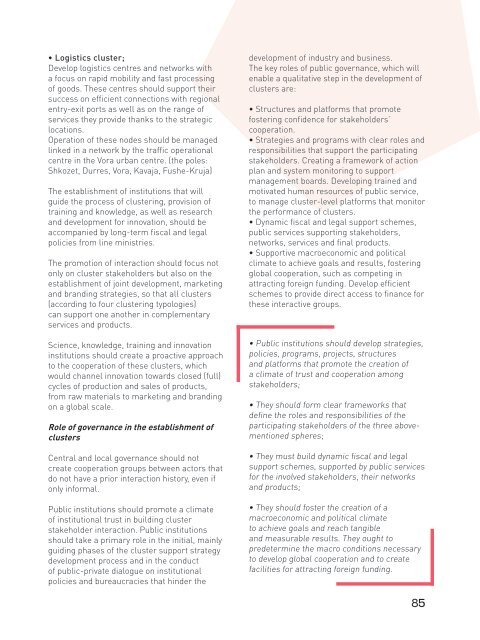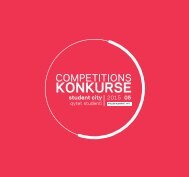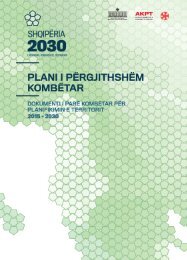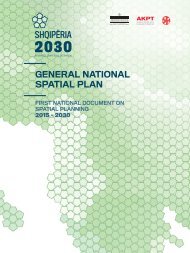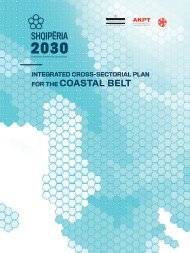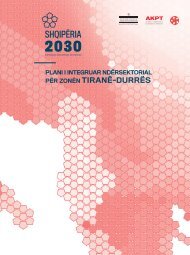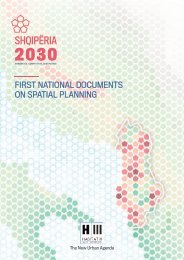Integrated Cross-Sectorial Plan of Tirana-Durres Area
The Albanian Government and the National Spatial Plan have identified the Tiranë-Durrës area, as one of the most important economic areas of the country, and of the Balkan region. To ensure a sustainable territorial and urban development of this area, the Ministry of Urban Development in cooperation with the National Territorial Planning Agency has taken the initiative to draft a Cross-sectoral Integrated Plan for the economic area Tiranë – Durrës. The metropolitan region under study includes territories administered by 5 municipalities: Tiranë, Durrës, Vorë, Shijak, Kamëz.
The Albanian Government and the National Spatial Plan have identified the Tiranë-Durrës area, as one of the most important economic areas of the country, and of the Balkan region. To ensure a sustainable territorial and urban development of this area, the Ministry of Urban Development in cooperation with the National Territorial Planning Agency has taken the initiative to draft a Cross-sectoral Integrated Plan for the economic area Tiranë – Durrës. The metropolitan region under study includes territories administered by 5 municipalities: Tiranë, Durrës, Vorë, Shijak, Kamëz.
You also want an ePaper? Increase the reach of your titles
YUMPU automatically turns print PDFs into web optimized ePapers that Google loves.
• Logistics cluster;<br />
Develop logistics centres and networks with<br />
a focus on rapid mobility and fast processing<br />
<strong>of</strong> goods. These centres should support their<br />
success on efficient connections with regional<br />
entry-exit ports as well as on the range <strong>of</strong><br />
services they provide thanks to the strategic<br />
locations.<br />
Operation <strong>of</strong> these nodes should be managed<br />
linked in a network by the traffic operational<br />
centre in the Vora urban centre. (the poles:<br />
Shkozet, <strong>Durres</strong>, Vora, Kavaja, Fushe-Kruja)<br />
The establishment <strong>of</strong> institutions that will<br />
guide the process <strong>of</strong> clustering, provision <strong>of</strong><br />
training and knowledge, as well as research<br />
and development for innovation, should be<br />
accompanied by long-term fiscal and legal<br />
policies from line ministries.<br />
The promotion <strong>of</strong> interaction should focus not<br />
only on cluster stakeholders but also on the<br />
establishment <strong>of</strong> joint development, marketing<br />
and branding strategies, so that all clusters<br />
(according to four clustering typologies)<br />
can support one another in complementary<br />
services and products.<br />
Science, knowledge, training and innovation<br />
institutions should create a proactive approach<br />
to the cooperation <strong>of</strong> these clusters, which<br />
would channel innovation towards closed (full)<br />
cycles <strong>of</strong> production and sales <strong>of</strong> products,<br />
from raw materials to marketing and branding<br />
on a global scale.<br />
Role <strong>of</strong> governance in the establishment <strong>of</strong><br />
clusters<br />
Central and local governance should not<br />
create cooperation groups between actors that<br />
do not have a prior interaction history, even if<br />
only informal.<br />
Public institutions should promote a climate<br />
<strong>of</strong> institutional trust in building cluster<br />
stakeholder interaction. Public institutions<br />
should take a primary role in the initial, mainly<br />
guiding phases <strong>of</strong> the cluster support strategy<br />
development process and in the conduct<br />
<strong>of</strong> public-private dialogue on institutional<br />
policies and bureaucracies that hinder the<br />
development <strong>of</strong> industry and business.<br />
The key roles <strong>of</strong> public governance, which will<br />
enable a qualitative step in the development <strong>of</strong><br />
clusters are:<br />
• Structures and platforms that promote<br />
fostering confidence for stakeholders’<br />
cooperation.<br />
• Strategies and programs with clear roles and<br />
responsibilities that support the participating<br />
stakeholders. Creating a framework <strong>of</strong> action<br />
plan and system monitoring to support<br />
management boards. Developing trained and<br />
motivated human resources <strong>of</strong> public service,<br />
to manage cluster-level platforms that monitor<br />
the performance <strong>of</strong> clusters.<br />
• Dynamic fiscal and legal support schemes,<br />
public services supporting stakeholders,<br />
networks, services and final products.<br />
• Supportive macroeconomic and political<br />
climate to achieve goals and results, fostering<br />
global cooperation, such as competing in<br />
attracting foreign funding. Develop efficient<br />
schemes to provide direct access to finance for<br />
these interactive groups.<br />
• Public institutions should develop strategies,<br />
policies, programs, projects, structures<br />
and platforms that promote the creation <strong>of</strong><br />
a climate <strong>of</strong> trust and cooperation among<br />
stakeholders;<br />
• They should form clear frameworks that<br />
define the roles and responsibilities <strong>of</strong> the<br />
participating stakeholders <strong>of</strong> the three abovementioned<br />
spheres;<br />
• They must build dynamic fiscal and legal<br />
support schemes, supported by public services<br />
for the involved stakeholders, their networks<br />
and products;<br />
• They should foster the creation <strong>of</strong> a<br />
macroeconomic and political climate<br />
to achieve goals and reach tangible<br />
and measurable results. They ought to<br />
predetermine the macro conditions necessary<br />
to develop global cooperation and to create<br />
facilities for attracting foreign funding.<br />
85


